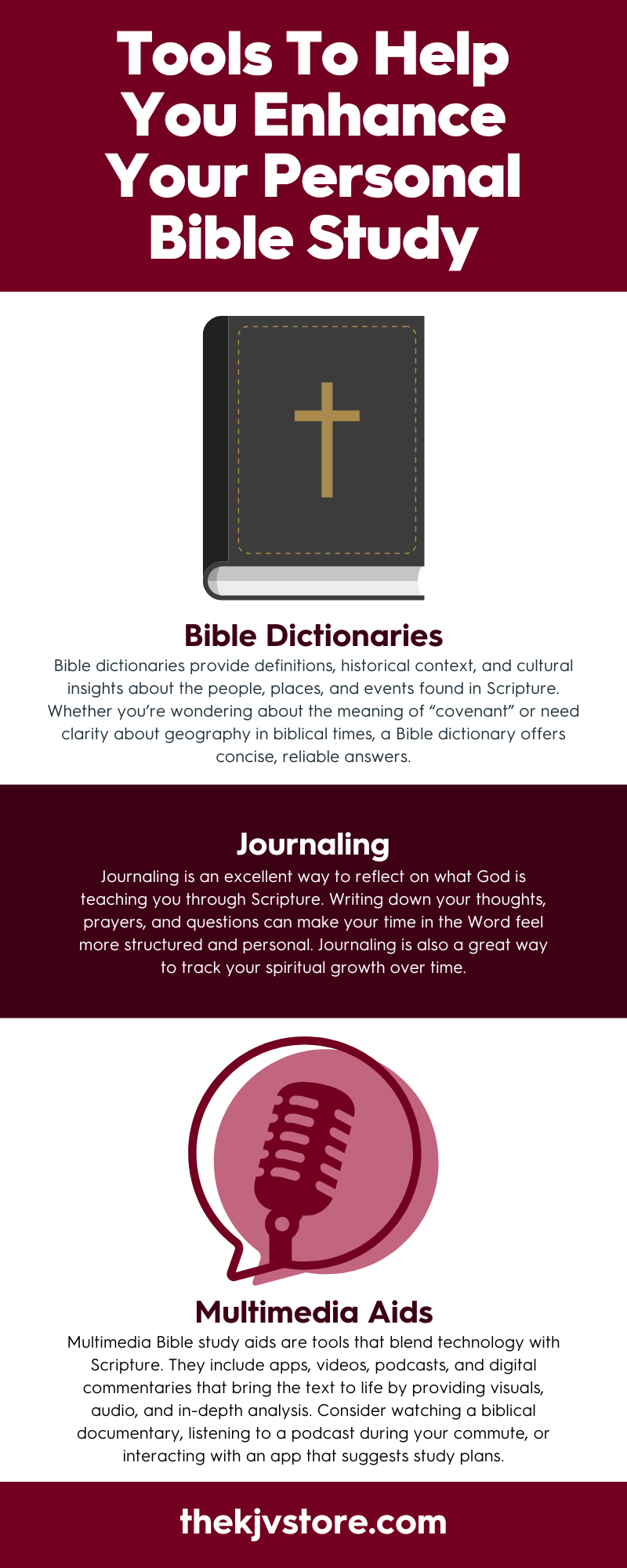Tools To Help You Enhance Your Personal Bible Study

Personal Bible study is when you explore Scripture on your own, creating a personal connection with God and focusing on insights that speak directly to your life and questions. Unlike group Bible study, which involves discussion and shared perspectives, personal study allows you to set your own pace and dig into topics that resonate most with you.
There are so many tools to help you enhance your personal Bible study. From traditional books to digital aids, these resources can help you stay organized and engaged as you explore biblical truths. Take a closer look at some effective options for enriching your Bible study routine.
Bible Dictionaries
Bible dictionaries provide definitions, historical context, and cultural insights about the people, places, and events found in Scripture. Whether you’re wondering about the meaning of “covenant” or need clarity about geography in biblical times, a Bible dictionary offers concise, reliable answers.
Using a Bible dictionary can deepen your study, make passages easier to grasp, and uncover details that you might otherwise overlook. When choosing one, look for a dictionary that suits your study goals, whether it's about historical details, language, or theological themes. It should also be written at a level you’re comfortable with and complement your preferred Bible translation for easy referencing.
Bible Encyclopedias
Bible encyclopedias provide a more comprehensive look into scriptural topics and themes compared to dictionaries. They offer lengthy explanations, often accompanied by visual aids such as maps and photographs. They’re useful whether you’re exploring a broad topic such as “prophets” or specific events like “The Babylonian Exile.”
This tool can enhance your personal Bible study by showing how specific parts of the Bible fit into the bigger story of God’s work. It makes connections between events, people, and teachings so you can better understand their meaning and relevance.
Study Bible
King James study Bibles combine Scripture with detailed notes, references, and insights to guide the reader’s understanding. For anyone serious about going deeper, this tool can provide answers to tough questions and highlight details you might otherwise miss. Study Bibles are available in various formats to meet the reader’s notetaking and studying needs.
Wide Margins
Wide-margin Bibles have an extensive space on the sides of each page to jot down personal reflections, questions, or cross-references. They’re perfect for those who enjoy journaling while reading Scripture.
Scofield Notes
C.I. Scofield was a pastor, theologian, and author who created the Scofield Reference Bible in 1909 to help Christians study the Bible more effectively. Scofield Reference Bibles are a type of study Bible that includes detailed notes, cross-references, and timelines to help readers explore and understand Scripture more thoroughly. They provide helpful explanations for challenging passages and connect related verses, making it easier to follow themes and ideas throughout the Bible. Having these notes inside the Bible, rather than in a separate book, can help keep you focused and engaged in your study.
Reference Bibles
Reference Bibles include cross-reference systems that connect key verses across different parts of the Bible. Popular systems like the Thompson Chain Reference Bible help you trace themes of love, faith, or prophecy throughout scripture. They’re invaluable when you want to explore Scripture holistically and see how different books of the Bible interconnect.
Red-Letter Bibles
Red-letter Bibles are unique editions where the words of Jesus are printed in red ink, making them stand out from the rest of the text. The coloring allows readers to easily identify Christ’s teachings and dialogue throughout the New Testament. By visually separating His words, these Bibles encourage deeper meditation on Jesus’s messages and their significance. Using a red-letter Bible in your study can help you focus more intentionally on Christ’s instructions.
Journaling
Journaling is an excellent way to reflect on what God is teaching you through Scripture. Writing down your thoughts, prayers, and questions can make your time in the Word feel more structured and personal. Journaling is also a great way to track your spiritual growth over time.
Many people use specific Bible journals that provide prompts to help them engage with the text. Alternatively, a simple notebook will do the trick. Journaling during your study allows you to process what you've learned and translate it into meaningful, actionable insights.
Annotating
Annotating involves highlighting key passages and adding notes directly onto the pages of your Bible. Highlighters, sticky tabs, and colored pens can make annotating more organized and even enjoyable. Whether you underline your favorite verses or jot down quick questions, this method reinforces what you’re learning. Annotating also helps you revisit ideas for deeper study later.
How you annotate is up to personal preference, but here are some general tips:
- Use materials that are gentle on the thin pages, such as archival pens, no-bleed highlighters, or pencils for erasable notes.
- Focus on marking key themes, meaningful verses, or sections that resonate personally, and jot down your reflections or questions for future study.
- Organize your notes with symbols or color-coding to make it easy to spot connections and insights later.
Multimedia Aids
Multimedia Bible study aids are tools that blend technology with Scripture. They include apps, videos, podcasts, and digital commentaries that bring the text to life by providing visuals, audio, and in-depth analysis. Consider watching a biblical documentary, listening to a podcast during your commute, or interacting with an app that suggests study plans.
To combine multimedia aids with personal Bible reading, start by reading a passage on your own and jotting down any questions or insights. Then, use multimedia resources to explore those points further, comparing what you learn with your initial reflections to deepen your understanding.
Devotionals
Devotionals are structured daily readings that blend Scripture with reflections and prayer prompts. They guide you through thoughtful applications of the Bible and provide valuable perspective to enhance spiritual growth. When using a devotional, set aside a consistent time, read the passages slowly, and take a moment to reflect, pray, or journal about what you’ve learned.
There are many categories of devotionals. Topical devotionals focus on specific themes, such as gratitude or faith. Chronological devotionals follow a daily or yearly plan. Audience-based devotionals are tailored for groups, such as couples, parents, or teens. To choose a devotional, consider your current season of life, spiritual goals, and the time you can commit each day.
Resources such as reference Bibles, Bible encyclopedias, devotionals, and multimedia aids can enhance your understanding of Scripture. Practices such as journaling and annotating help you reflect and gain fresh insights. By combining these tools and methods, you can uncover deeper meanings in the text, keep a record of what you’ve learned, and connect more closely with God’s Word.

